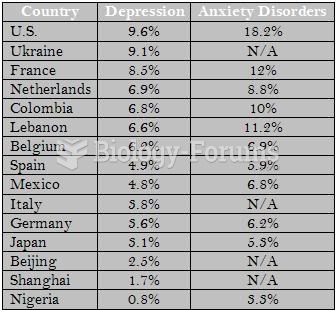|
|
|
There are immediate benefits of chiropractic adjustments that are visible via magnetic resonance imaging (MRI). It shows that spinal manipulation therapy is effective in decreasing pain and increasing the gaps between the vertebrae, reducing pressure that leads to pain.
A cataract is a clouding of the eyes' natural lens. As we age, some clouding of the lens may occur. The first sign of a cataract is usually blurry vision. Although glasses and other visual aids may at first help a person with cataracts, surgery may become inevitable. Cataract surgery is very successful in restoring vision, and it is the most frequently performed surgery in the United States.
The calories found in one piece of cherry cheesecake could light a 60-watt light bulb for 1.5 hours.
The Romans did not use numerals to indicate fractions but instead used words to indicate parts of a whole.
Approximately 25% of all reported medication errors result from some kind of name confusion.







